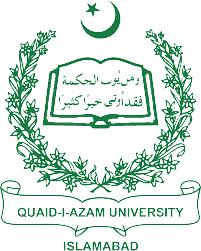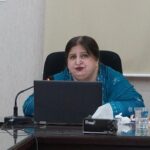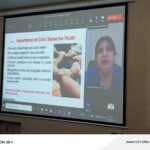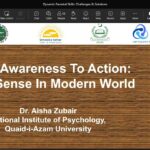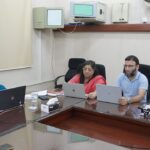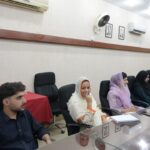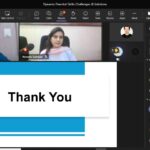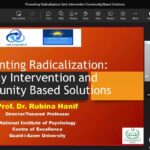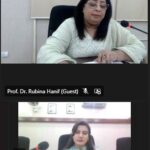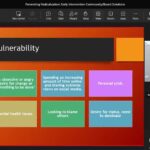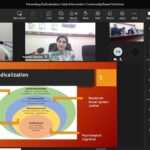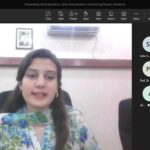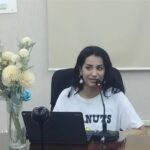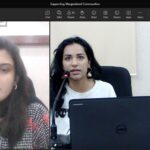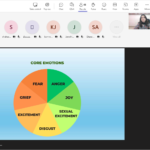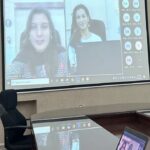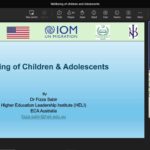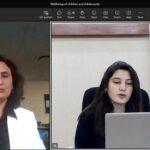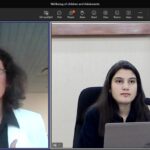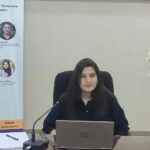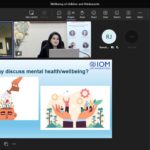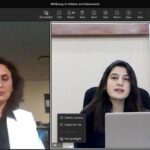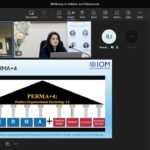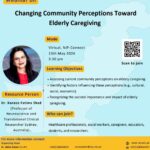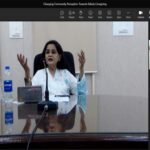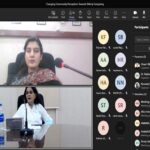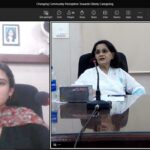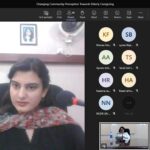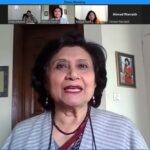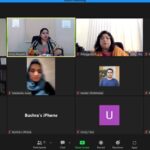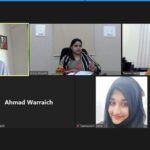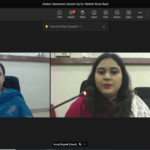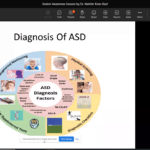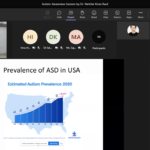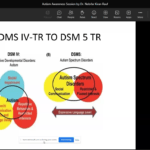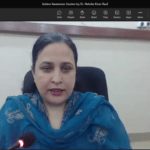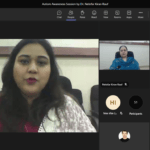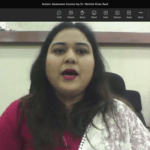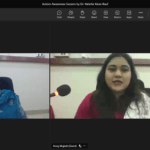NIPConnect
NIP-CONNECT
Webinar on
From Awareness to Action: Civic Sense in the Modern World
Sept. 27, 2024
On September 27, 2024, NIP Connect, in collaboration with Umeed-e-Sehar, hosted a webinar titled “From Awareness to Action: Civic Sense in the Modern World,” led by Dr. Aisha Zubair, Assistant Professor at the National Institute of Psychology, Quaid-i-Azam University, Islamabad. The session was designed to explore the importance of civic responsibility in modern society and the connection between rights and responsibilities, emphasizing the role of active citizenship.
Dr. Zubair highlighted various strategies to cultivate civic sense, including parental guidelines for fostering responsible behavior in children. She also discussed the need for both individual and collective efforts to build civic awareness and responsibility, emphasizing that active citizenship begins at home, extends to schools, and must be supported by broader societal efforts.
The webinar featured participants from diverse backgrounds, including teachers, parents, researchers, school counselors, and students, representing various institutions. It was an interactive session that provided practical advice to the participants’ questions. One participant asked how to control negative peer influence on a child’s civic behavior, seeking guidance on promoting positive engagement. Another inquired about the balance between government regulations and grassroots efforts in enhancing civic sense. There was also a question on how to cater to cultural diversity while fostering civic responsibility.
In response, Dr. Zubair emphasized the importance of open communication between parents and children, encouraging critical thinking, and setting clear boundaries to manage peer influence while promoting positive engagement. Regarding the role of regulations versus grassroots efforts, she highlighted that both are crucial—government regulations provide structure and enforce civic behavior, but grassroots efforts foster ownership and responsibility at the community level. For sustainable change, these approaches must work in tandem. When addressing cultural diversity, she stressed that civic education should be inclusive and adaptable to various cultural contexts. While respect, responsibility, and community engagement are universal principles, the methods to promote them must consider cultural sensitivities and diversity. The session provided valuable insights and practical strategies for fostering civic responsibility across different societal roles and contexts.
Webinar on
Preventing Radicalization: Early Intervention and Community-Based Solutions
Sept. 20, 2024
On September 20th, 2024, the first webinar in a series on Dynamic Parental Skills: Challenges and Solutions was conducted by NIP Connect in collaboration with Umeed-e-Sehar. The webinar, titled “Preventing Radicalization: Early Intervention and Community-Based Solutions,” was led by Professor Dr. Rubina Hanif, Director of the National Institute of Psychology, Quaid-i-Azam University, Islamabad. The event brought together an audience of parents, researchers, school counselors, teachers, and students. Professor Dr. Rubina Hanif provided an insightful overview of the process of radicalization, distinguishing between violent and non-violent radicalization. She discussed the symptoms of vulnerability that could indicate susceptibility to radical ideologies, highlighting how early detection and intervention can prevent individuals from becoming radicalized. The process of radicalization and how individuals progress from initial discontent to adopting extreme views. The vital role of parents, teachers, and peers in promoting resilience, identifying signs early, and guiding young people away from extremist influences. The significance of implementing community-based programs aimed at fostering resilience and critical thinking skills in youth. In the Q&A session, several important questions were raised by attendees: What role can social media play in preventing radicalization? Professor Dr. Rubina Hanif emphasized the need for social media literacy programs that teach youth to critically analyze the content they engage with and avoid online radicalizing influences. How can teachers identify early signs of radicalization in students? She suggested that teacher training programs should include modules on recognizing early warning signs, such as sudden ideological rigidity, withdrawal from social circles, or increased aggression. What community programs are effective in building resilience against radicalization? Dr. Hanif highlighted successful models of peer mediation and community dialogues that encourage youth to express their concerns in safe spaces and build critical thinking skills. The webinar concluded with a call to action for schools, families, and communities to collaborate in creating supportive environments where youth can thrive and resist extremist ideologies.
Webinar on
Supporting Marginalized Communities
May 22, 2024
On May 22, 2024, the National Institute of Psychology (NIP), Quaid-i-Azam University, Islamabad hosted a webinar through its NIP Connect forum titled “Supporting Marginalized Communities” under Project sponsored by IOM. Ms. Sonia Ahmad, a Registered Psychotherapist and Canadian Certified Counsellor with the Canadian Counselling and Psychotherapy Association (CCPA), Canada was the speaker. Ms. Noreeta (Research Associate cum Lecturer) moderated the talk. Ms. Sonia highlighted the unique challenges faced by marginalized communities in Pakistan who are is disadvantaged status and how this impact mental health of people belonging to these communities. She related emotional and stress-based experiences of the majority that make them less inclusive and fearful of minorities they know less about like ethnic, religious, and gender-diverse communities like Khawajasira. Based upon her expertise in providing mental health and psychosocial support to people with multicultural backgrounds, she suggested how to be empathic to promote inclusivity and create safe spaces for diverse populations. She emphasized the need to move away from stigmatization and shame culture that is commonly witnessed in eastern culture like Pakistan. The webinar attracted 91 participants from a variety of organizations in Rawalpindi, Islamabad, KPK, Kashmir, and Balochistan. The session was quite interactive and engaging. Participants posed numerous questions inquiring about role of spirituality in supporting marginalized communities; the status of older adults as a marginalized group; the status of LGBT individuals in Pakistan; the role of stress in effecting immune system; significance of existing laws and policies in uplifting people in disadvantaged status, etc. Ms. Ahmad addressed all questions comprehensively, showcasing her expertise and depth of knowledge by highlighting differences and similarities between individualistic and collectivist cultures. The quality of the questions and the engaging nature of the session underscored the webinar’s success as shown by times that exceeded 20 min. more than planned. , leaving participants with valuable insights and practical knowledge for supporting marginalized communities. In their feedback, one of the participants from Abbottabad appreciated the kind and clear language of Ms. Sonia. She told me that her take away from the talk was learning about difference in shame and guilt and that even a single individual is important to bring change in the society. She also learnt through webinar to empathize with marginalized communities than to outcaste them.
Webinar on
Wellbeing of Children and Adolescents
May 14, 2024
Webinar on “Wellbeing of Children and Adolescents” was conducted on 14th May, 2024 by Dr Fizza Sabir, She is a Senior Lecturer at Higher Education Leadership Institute, Australia. She has her Ph.D. from the School of Education, University of Adelaide , Australia, and Master degree in Assessment & Evaluation from the University of Melbourne , Australia. The webinar was initiated with a simple definition of well-being; defining it as an essential component of how people feel, behave and function at both personal and social level. She explained wellbeing as a holistic, multidimensional concept encompassing physical, emotional, social, intellectual, spiritual and also economic aspects of a person’s life. She emphasized that well-being is not merely the absence of illness but a positive state of individual that enables individuals to thrive and flourish enabling our optimal functioning, various factors that influence the wellbeing of children and adolescents, including family dynamics and relationships, social media and technology, academic pressure and expectations, social and cultural norms, and trauma and adversity. The role of positive psychology while explaining PERMA model for internal and external self-awareness were discussed. Further common mental health challenges faced by children and adolescents, including anxiety, depression, eating problems and post-traumatic stress disorder (PTSD), attention deficit hyperactivity disorder (ADHD), substance abuse and addiction were shared.
Dr. Fizza Sabir emphasized the role of schools, communities, and healthcare systems in promoting the wellbeing of children and adolescents. She recommended self-care for children and adolescents. Importance of school-based interventions that are based on emotion-focused, problem-focused early intervention program for children and adolescents were discussed. Practical strategies and skills for creating a supportive environment, including active listening, empathy, creative expression, art work, play therapy, mindfulness, self-care, resilience building and coping skills for children and adolescents were highlighted.
On the whole, it was recommended that teachers and management of schools must be the targeted ones as they play crucial role in the constructive development of children and adolescents in combination with parents and family members. The webinar was attended by 107 participants from various regions. It was an interactive session where participants engaged actively, asking questions on diverse topics. One participant inquired about how to become externally self-aware, while another asked about developing a positive mindset amidst chaos. Additionally, few questions were related to the content of the webinar. The audience appreciated the webinar and asked pertinent questions from the speaker.
Webinar on
Changing Community Perceptions Towards Elderly Caregiving
May 13, 2024
National Institute of Psychology, Quaid-i-Azam University held a webinar on Changing Community Perceptions Towards Elderly Caregiving under the NIP Connect Forum in collaboration with IOM on 13th May, 2024. The speaker of the webinar was Prof. Dr. Kaneez Fatima Shad, Professor Kaneez Fatima-Shad is an Australian neuroscientist with a medical background, holding a Ph.D. from UNSW and a postdoctoral fellowship from Allegheny University, USA. With over 30 years in neuroscience research, teaching, and administration, she has worked at universities in Australia, the USA, UAE, Bahrain, Pakistan, and Brunei. As a full professor since 2006 and an executive administrator, she has secured significant grants for dementia and Alzheimer’s research. She has mentored 34 Ph.D. students and postdocs, developed novel technologies, and contributed to curriculum development. She is an active member of various neuroscience societies and serves as an editor for scientific journals. Prof. Kaneez highlighted the importance of essential requisites that need to be taken care of regarding the process of ageing. She further pointed out the role of nutrition, lifestyle medicine, and positive thinking to regulate the negative repercussions of ageing and uplifting mental as well as physical health of the senior citizens. Likewise, social bonding among family members and creating safe and protective environments for the elderly would augment the caregiving quality. In addition, the role of educational institutions, social media forums, and society in general was deliberated in altering the perceptions of community towards elderly caregiving. Perceptions regarding old homes need to be modified and the existence of such institutions could play facilitative role in elderly wellbeing. It was also emphasized that ageing is an imperative part of life span, so we all need to initiate a thorough plan to embrace the process of ageing within the context of our cultural and social indicators. Moreover, government in collaboration with civil society can devise health care strategies which facilitate in generating proactive measures for the elderly caregiving. The webinar saw the participation of 35 attendees who engaged actively by inquiring about the impact of religiosity on elderly caregiving. They also sought additional clarification on various topics covered during the session.
4th Live Webinar on
Conducting Interdisciplinary Research in Social Sciences and Humanities
20th March 2024
On 20th March 2024, NIP-Connect hosted its 4th webinar in the ongoing series, titled “Conducting Interdisciplinary Research in Social Sciences and Humanities” featuring Dr. Asir Ajmal as the resource person. The session was moderated by Ms. Noreeta Suleman, highlighted Dr. Ajmal’s exceptional expertise, offering invaluable insights into interdisciplinary research. The webinar focused on essential aspects of interdisciplinary research, including the distinction between interdisciplinary and multidisciplinary approaches, strategies for establishing a conceptual model, effective topic selection methods, considerations for choosing methodologies, and a balanced discussion on the pros and cons of interdisciplinary research. Attendees from various cities and institutes engaged in lively discussions, commending Dr. Ajmal for his profound knowledge and engaging presentation style, making the session an insightful exploration of interdisciplinary research within the social sciences and humanities landscape.
Online Training on Workplace Sexual Harassment
27th Dec. 2023
NIP has successfully started its new series of webinars with name of NIP-CONNECT where the aim is to spread the knowledge of psychosocial issues in masses and connecting field experts with community. The first webinar of the series was conducted on December 27, 2023 on “Creating Harassment-Free Environment” by Maliha Hussain who is working as Executive Director of Mehergarh: A Centre for Learning. She is also working closely with federal and provincial governments for implementations of sexual harassment law in workplace settings. The webinar was attended by NIP faculty, students, and faculty from other universities, lawyers, and many individuals who were working in different organizations. Maliha Hussain firstly created a baseline understanding by discussing the definitional aspects of sexual harassment and related myths after which she discussed the laws. Particularly; the myth, that victims are mainly victimized due to their appealing attires, remained focus of detailed discussion among audience. Not only myths were discussed but participants came up with published and personal incidents of harassment and related their experiences with definitions and myths of sexual harassment.
Maliha Hussain also emphasized that creating awareness regarding harassment is responsibility of the organizations. Employees should be encouraged to report incidents of sexual harassment and management must be well qualified and should have standing inquiry committees to penalize the perpetrators. Thus, creating awareness regarding the said issue is key responsibility of the organizations in order to condemn this act and create their environments harassment free. In case of absence of standing inquiry committee or dissatisfaction with their performance, an employee can directly file the case in Ombudsperson (Muhtasib) within thirty days of decision from standing inquiry committees. The take-home message of the webinar was to create awareness on sexual harassment at every level (including households, workplaces, and educational institutes) so that people will not have to suffer from the said issue.
A webinar on “Autism Spectrum Disorder (ASD): Symptoms Recognition and Intervention” (4th April, 2023 )
A webinar titled “Autism Spectrum Disorder (ASD): Symptoms Recognition and Intervention” was conducted on 4th April, 2023 from platform of NIP-CONNECT. The webinar was particularly arranged for parents, early school teachers, caretakers of children with ASD, school counselors, medical and clinical psychology internees, and medical health professionals. Resource person for the seminar was DR. Nelofar Kiran Rauf who has her PhD in the same field and who is active member of international organizations which are working on ASD i.e., WAO (World Autism Organization) and INSAR (International Society for Autism Research). The webinar started from discussion of transition of symptoms of ASD from triad to dyad. These dyad symptoms include impairment in two areas that is; Social Communication and Interaction and Restrictive Repetitive Patterns of Behaviors. Resource person also discussed the changes in symptoms of ASD during six, nine, twelve, sixteen, and twenty four months of the age. An elaborated discussion on causes indicated various possible causes including genetic mutation, malnutrition, environmental toxicity (contamination of Lead into water or taking Lead based medications for a longer period of time), and family history. She explained therapeutic interventions used for treating ASD and compared various therapeutic regimes with reference to their empirical evidence. The webinar was attended by national and international audience and question answer session revealed more information regarding various techniques of treatment which are being used in Pakistan and other countries.

